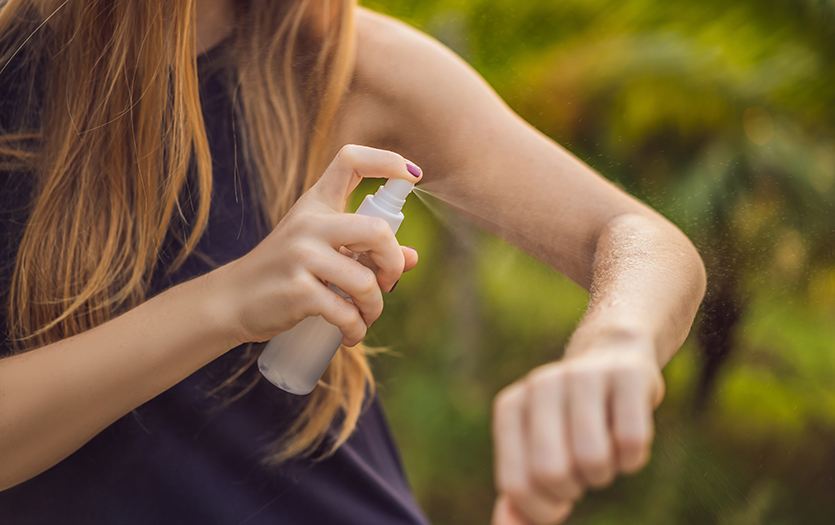
Enjoying a hike, a backyard barbecue or a quiet moment on the porch can be delightful, but the dangers of insect bites and the diseases they may carry are ever-present. Understanding how to use insect repellents can provide some defense against these risks. Below, we discuss the various bug deterrents available, which provide the most effective protection and guidance on using them safely.
Importance of insect repellents
Insect repellents significantly reduce your chances of being bitten by insects or spider-like arachnids such as mosquitoes, biting flies and ticks, which can carry diseases and infections. In certain regions of the world, mosquitoes can transmit diseases such as West Nile virus, Zika virus and malaria. Ticks also pose a considerable threat, as their bites can cause severe illnesses like, Lyme disease and Rocky Mountain spotted fever. Bites from biting flies can be painful and may lead to skin infections.
Types of insect repellents
Most deterrents mask the scent that attracts insects, making it difficult for them to detect and bite you. With numerous products in stock, it's vital to understand which repellents are most effective and suitable for your outdoor needs. Here's a closer look at some popular options to choose from:
- DEET is a common active ingredient in many bug sprays and is renowned for its long-lasting effectiveness against mosquitoes and ticks. A solution of 23.8% DEET provides about five hours of protection from mosquitoes. Although available in varying strengths up to 100%, solutions greater than 50% do not provide substantially higher protection. Repellents with 10% to 24% DEET are effective in most situations. The American Academy of Pediatrics (AAP) and other experts suggest that DEET in concentrations of 10% to 30% is safe to apply to children older than two months.
- Picaridin has been available for many years in Europe. In the United States, it is available in a spray with concentrations of up to 20%. Picaridin is odorless, non-sticky and less likely to cause skin irritation than DEET. It may work as effectively as DEET in repelling insects, providing as many as eight hours of protection and does not damage synthetic fabrics or plastics. The AAP does not recommend using Picaridin on children younger than two months.
- Permethrin is a plant-based insecticide that works on contact and when applied to clothing and other fabrics, such as mosquito netting and tent walls, rather than directly to the skin. When combined with DEET, permethrin provides even better protection against mosquitoes. Permethrin-treated clothing continues to protect even after washing.
- P-menthane-3,8-diol, commonly known as lemon eucalyptus oil, offers up to two hours of protection against mosquito bites. Apply it only two times a day, and do not use it on children younger than three.
- Soybean oil insect repellents containing 2% soybean oil provide one to four hours of protection from mosquitoes and are safe for use on infants and children.
- IR3535 is a chemical similar to the amino acid alanine and can protect against mosquito bites for up to one hour.
While many insect repellents provide reliable and extended protection, some products on the market do not offer long-lasting defense against bug bites. Citronella, a lemon-scented oil that provides 15 to 20 minutes of mosquito protection, can be found in lotions or candles. However, there's no scientific evidence that citronella candles are effective. Other plant oils, such as lavender and geranium, provide less than 30 minutes of protection against mosquitoes and aren't recommended.
Additional products that fall short in terms of prolonged protection include:
- Electronic (ultrasonic) devices
- Electrocuting devices ("bug zappers")
- Mosquito traps
- Geranium house plants
- Citronella candles
- Thiamine (vitamin B1) supplements
- Skin moisturizers without approved insect repellents
- Wrist, ankle and neck bands containing repellents like DEET or citronella
Using insect repellents safely
Improper use of repellents can cause skin irritation or other adverse effects. To minimize risks and maximize protection, always read and follow all instructions on the product label. The U.S. Environmental Protection Agency (EPA) recommends the following precautions for using insect repellents:
- Apply repellents only to exposed skin or clothing, as directed on the product label. Do not use under clothing.
- Never apply repellent to cuts, wounds or irritated skin.
- Avoid applying repellents to the eyes and mouth and use sparingly around the ears.
- When using sprays, apply to your hands first, then to face.
- Do not allow children to handle the product. Apply it to your hands first, then to the child, avoiding their hands.
- Do not spray in enclosed areas, such as inside a car.
- Avoid breathing repellent sprays.
- Do not use repellents near food.
- Use just enough repellent to cover exposed skin or clothing. If biting insects are not deterred by a thin film, apply more.
- After returning indoors, wash the treated skin with soap and water and then bathe. Wash treated clothing before wearing it again.
- When using both sunscreen and insect repellent, apply sunscreen first. Wait at least 20 minutes for the sunscreen to absorb into the skin and dry before applying repellent.
Closing remarks
If you or your child experience a reaction to an insect repellent, stop using it, wash the treated skin and call your primary care provider or local poison control center. If seeing a doctor, bring repellent to the appointment. Consult your doctor for any questions or concerns about using insect repellents, especially if you are pregnant or nursing.
Looking for a provider?
PPG – Family Medicine provides expert care for all ages and genders. Whether it's regular check-ups, sports physicals or specialized care, we're here for you. To establish care with a PPG – Family Medicine provider, schedule an appointment online here or call our 24/7 scheduling center at 206-785-2631.
Copyrighted material adapted with permission from Healthwise, Incorporated. This information does not replace the advice of a doctor.




